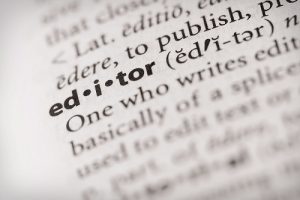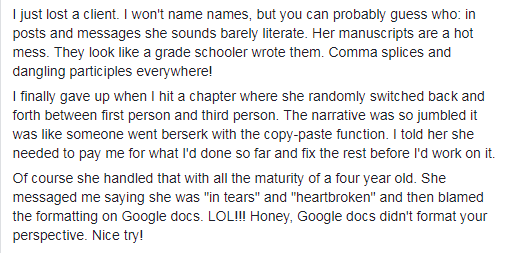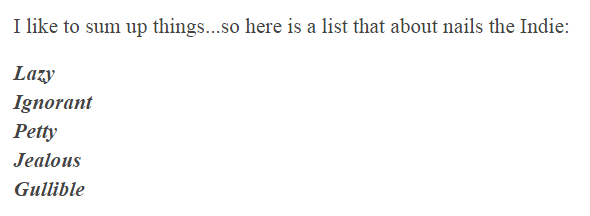
If you ask a random sampling of indie authors how they feel about editors, you’ll probably get a wide range of responses.
Some have worked with editors they loved from the start. Some had a few false leads before they found the right editor. And many have a notebook full of advice on what (and occasionally who) to avoid. (That advice can vary from author to author, especially on the subject of what an editor should charge.)
Lastly, especially among the unpublished and those who haven’t worked with an editor, you’ll probably find a surprising amount of distrust and dislike. Some people attribute this to fear of criticism. The thing is, it’s not that simple.
For a small subset of the writing population, this reaction does stem from a fear of being told they don’t measure up. Others don’t understand the value of a second, trained set of eyes in polishing their work for publication.
But many of us have seen statements from “professional” editors that have made us, well, wary.

An unedited, unpolished manuscript is where authors often feel most vulnerable. We know it has lurking typos and awkward sentences. We suspect there may be passages that make sense to us, but may not make sense to anyone else. We may not have even shown it to anyone else yet.
Perhaps the author in the screen shot above could have used to better prepare their story for editing. I also don’t discount Google’s role in some of the manuscript’s problems; I’ve seen some major formatting disasters from Google docs. But an editor airing their scorn for an unexperienced client in a public group is almost never appropriate, and definitely wasn’t in this case.
Think of it like this: if your doctor talked about your body and your medical history to their friends the way this editor talks about their client, would you still want to see that doctor? What if it was your therapist? Or your dentist?
Although there generally isn’t a strict non-defamation/non-disclosure agreement between an editor and an author, it’s reasonable for authors to expect that they and their work will be treated with courtesy, respect, and professionalism. If you’re an editor, for the love of all that is good don’t do this!

Editors and other publishing professionals who show this level of disdain for their client base are doing no one any favors. They besmirch the reputation of everyone in their industry, and cause even the most confident author to wonder what their editor really thinks of their work.
The good news is that editors with these kinds of opinions are a small minority. I’ve been lucky enough to work with a number of talented, considerate editors, and I’ve met tons more. The vast majority of these people will respect you and respect your work as long as you extend the same courtesy to them.
In next week’s post, I’ll outline some helpful tips for finding a good editor and making the most of their services. Stay tuned!

Jacqueline Church Simonds says:
I am both an editor and an editee. Some authors will not allow an editor to perform the tasks necessary, sure that their work is perfect right out of the box (hint: it isn’t). Not all editors are right for all authors. Some editors should be stuffed in a cage and fed raw meat once a week. Some authors need to be shot with the Clue Gun (Get a clue! Get a clue! is what this sounds like when fired). Whining about clients or editors on social media is bad form, PERIOD (disclosure: I have, on occasion, done this, but not as nastily as the above examples).
You are right to point out that, a) this is a professional relationship. Both the author and the editor need to behave in a manner that is respectful. But if the relationship doesn’t work, end it in the most respectful way possible.
b) Editors are notoriously tight-lipped about a client’s work. I’ve never met an editor – even the wolverine sort – who would divulge the plot highlights, etc of a manuscript they were working on. I have had 2 clients demand I sign an NDA agreement. I will no longer do this and will walk away if it ever happens again. This shows a basic misunderstanding and distrust of a business relationship – an it almost always ends poorly.